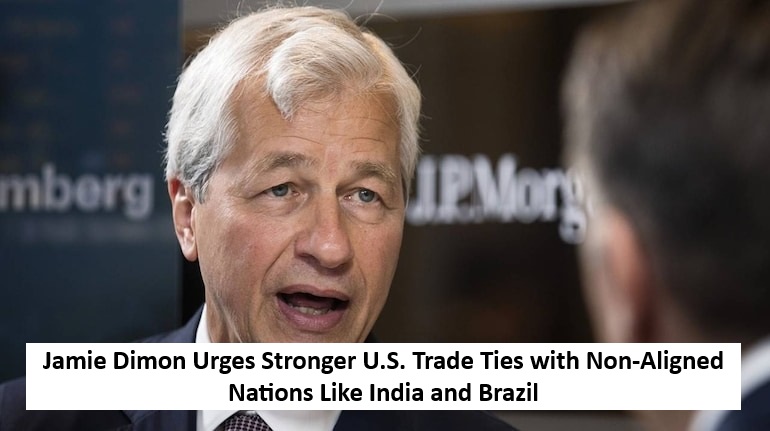
Jamie Dimon, CEO of JPMorgan Chase & Co., has recommended that the United States deepen trade and investment relations with non-aligned countries like India and Brazil. In his annual letter to shareholders, Dimon stressed that extending economic cooperation could foster stronger global partnerships without demanding political alignment.
According to Dimon, the U.S. accounts for $2.5 trillion of the global $20 trillion annual trade. He suggested that Washington needs to be more proactive in pursuing trade agreements with countries such as the UK, Australia, Japan, and the European Union—many of which have signed deals with China in recent years.
Trade as a Tool for Strategic Partnerships
Dimon advocated for a policy of engagement with nations outside formal alliances. “We don’t need to ask many nonaligned nations, like India and Brazil, to align with us – but we can bring them closer by simply extending a friendly hand with trade and investment,” he wrote.
His comments come at a time of growing global trade uncertainty, partly driven by a wave of tariffs imposed by former President Donald Trump on several countries, including India.
India's Position on Tariffs and Trade Talks
India has yet to retaliate against the tariffs. A senior Indian official told Reuters that New Delhi is focusing on finalizing a long-delayed Bilateral Trade Agreement with the U.S., likely to be concluded later this year.
Economic Concerns Around Tariffs
Dimon echoed Federal Reserve Chair Jerome Powell's concerns about inflation and the potential economic consequences of tariffs. He warned that recent tariffs may raise inflation and increase the likelihood of a recession.
“Prices remain relatively high despite a market slump,” Dimon wrote. “The recent tariffs will likely increase inflation and are causing many to consider a greater probability of a recession.”
He further warned that rising input costs and demand shifts could push prices higher across both imported and domestic goods. Tariffs, while possibly justified in certain contexts, risk triggering retaliatory actions, reducing business confidence, and dampening corporate investment.
Wider Economic Risks and Global Volatility
Dimon also highlighted broader economic risks, including the U.S.’s elevated fiscal deficits, high asset valuations, and the global trend of rearmament. He noted that delays in resolving trade tensions could worsen long-term economic instability and market volatility.
“The faster this issue is resolved, the better,” he cautioned, emphasizing the urgency of stabilizing trade relations to preserve global financial health.
Read More: Aramco Under Fire: Second Drone Attack in 48 Hours Rattles Global Oil Markets

 Share
Share_722031383_100x75.jpg)



